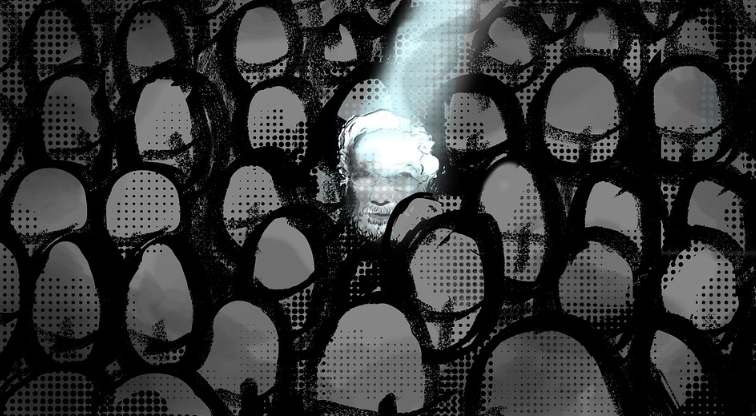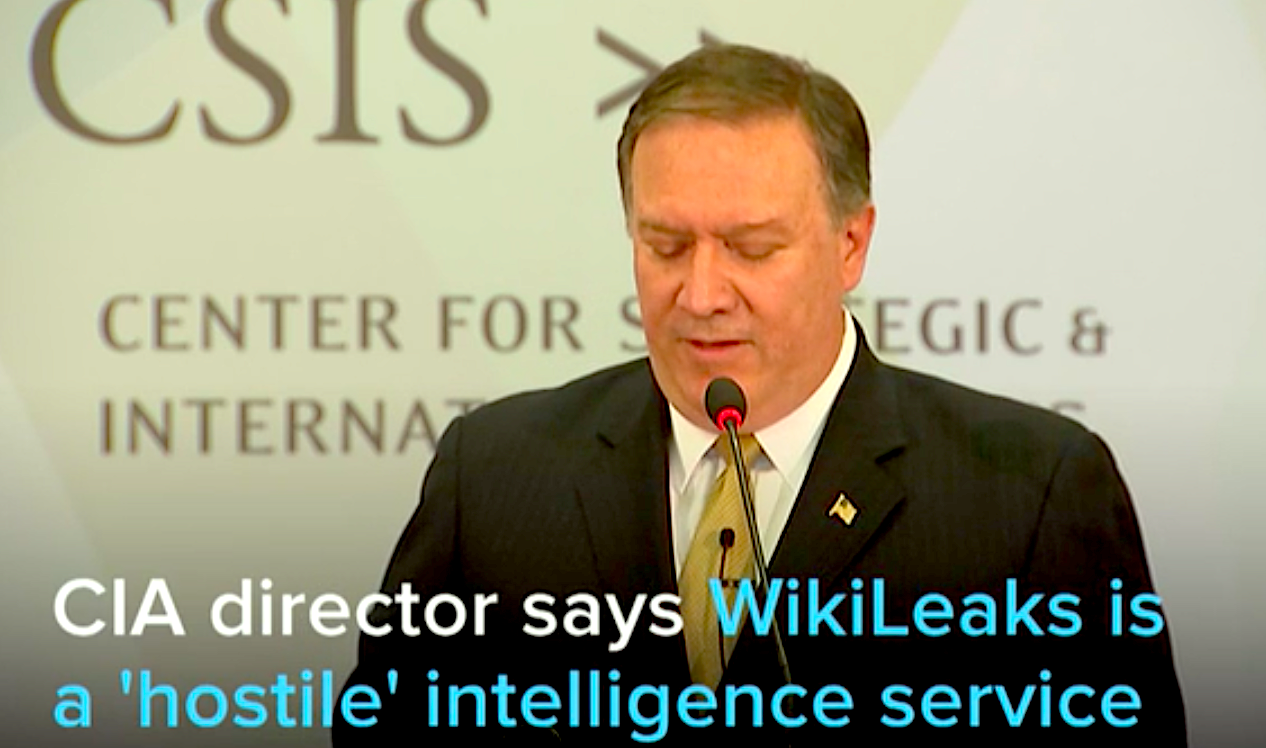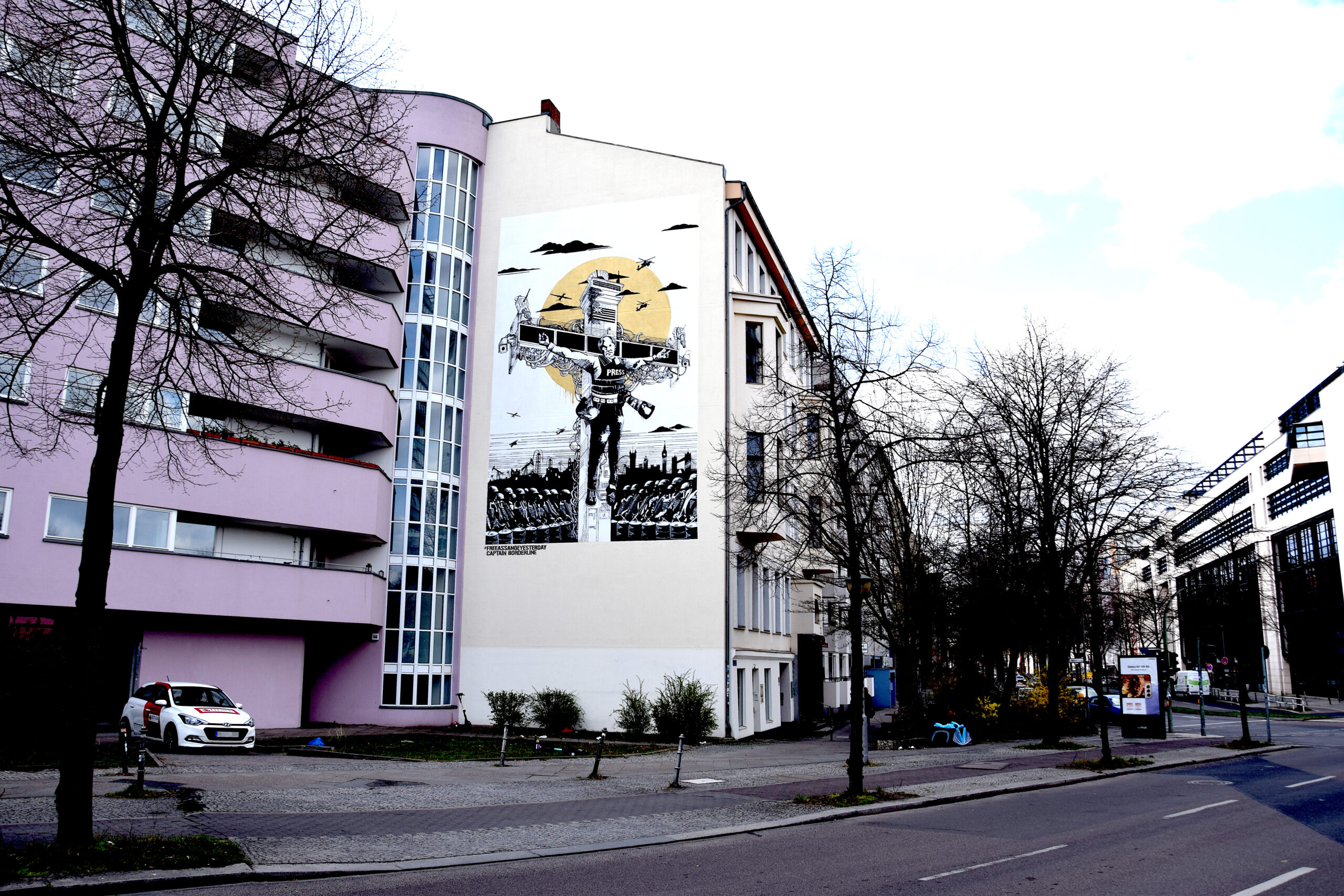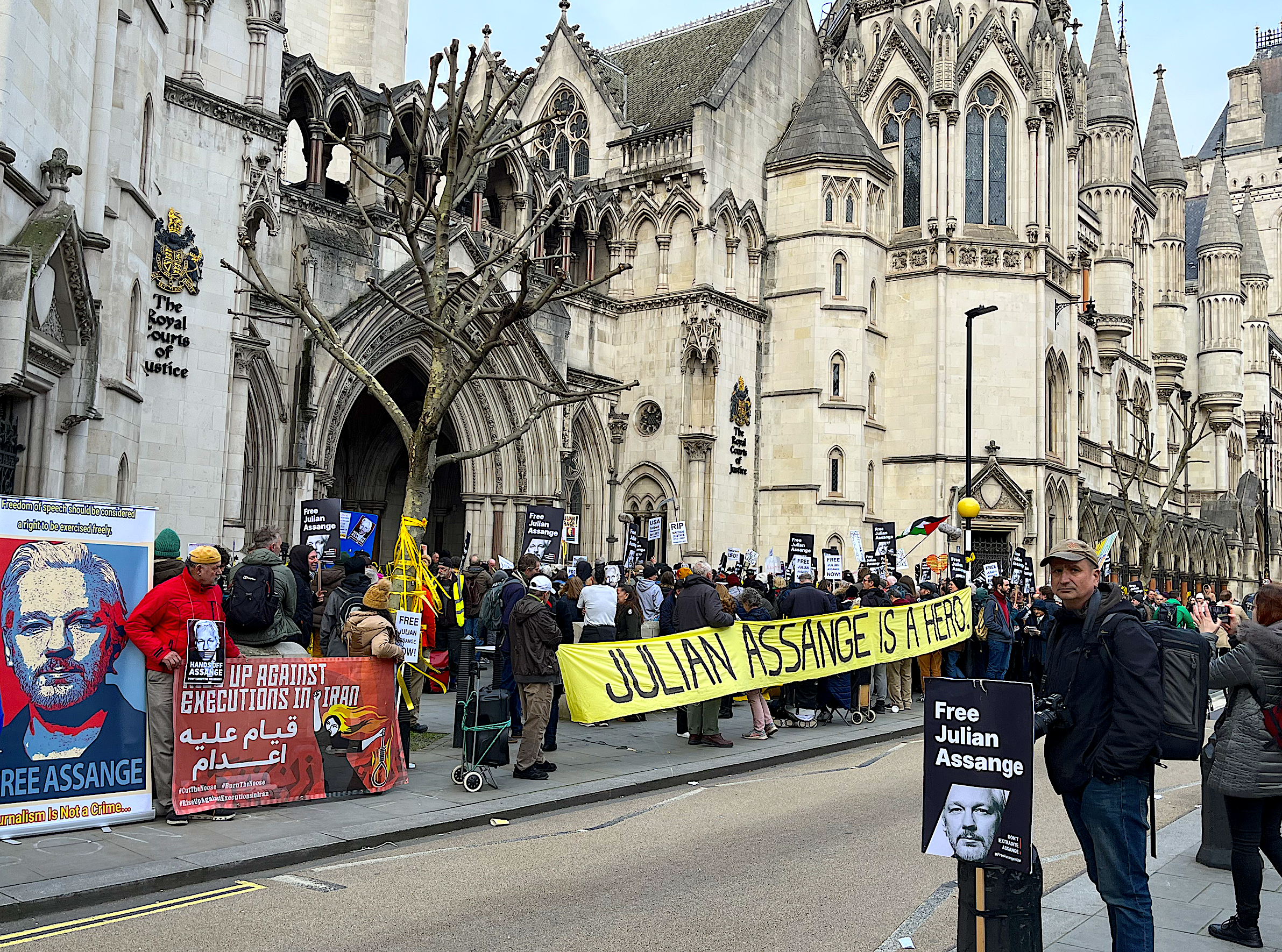Close to the conclusion of the WikiLeaks publisher’s two-day U.K. High Court appeal against his extradition, a gaping hole appeared in plans to shunt him onto a plane to the U.S., writes Mary Kostakidis.

(Pixabay)
By Mary Kostakidis
Pearls and Irritations
 In the final moments of the hearing on Feb. 21, Ben Watson KC representing the U.K. home secretary, admitted additional charges could be laid against Julian Assange in the U.S. that carry the death penalty, such as aiding and abetting treason.
In the final moments of the hearing on Feb. 21, Ben Watson KC representing the U.K. home secretary, admitted additional charges could be laid against Julian Assange in the U.S. that carry the death penalty, such as aiding and abetting treason.
Asked by the judge whether there is anything that can be done to prevent a death penalty being imposed, he replied: “It would be very difficult to offer assurances to prevent the death penalty from being imposed.” (Since Assange is charged with a federal and not a state crime he could get a death sentence no matter if the state he is tried in, in this case Virginia, has a death penalty or not.)
The wording is significant — it was not a difficulty in “accepting” an assurance but in its offering. The U.S. has never offered an assurance it won’t seek the death penalty because the home office has never asked for one, the court was told. This is despite the fact that U.K. extradition to a country with the death penalty is prohibited by the U.K.-U.S. Extradition Treaty and that the home secretary must seek such assurances.
What are the implications for the U.K. secretary of state who has already rubber stamped the extradition and for the recent High Court’s decision approving it?
Assange faces another wait to learn whether the two justices will decide it and other grounds warrant a full appeal.
But time is of the essence for Assange who has barely seen sunlight for 13 years, at 52 has had a stroke and is exhibiting the effects of sustained relentless anxiety. He faces the prospect of inhumane conditions in a U.S. SuperMax prison for life — solitary confinement in a steel shoebox — and the evidentiary court found he would be at risk of killing himself.
Assurances subsequently offered by the U.S. that it would not mistreat Assange (but not that it wouldn’t seek the death penalty) were accepted by the High Court judges who overturned the decision to refuse extradition are in any event not worth the paper they are written on said Amnesty International, as the U.S. reserves the right to recant them.
The court heard Assange was too unwell to attend. Had he been present, as he had wanted to be, he would have been in an iron cage high above the court to the right of the judges as if he were a violent offender, unable to communicate with his lawyers.
He isn’t violent of course, but it is a reminder to him and to us all of his place in this exercise of British justice. He is convicted of nothing, but wanted by a superpower whose criminality he exposed because he published evidence proving it. This is the first hearing where U.S. criminality was elaborated on by his lawyers. U.S. State criminality.
Assange’s defence team did a brilliant job arguing the numerous grounds for an Appeal — their best performance to date — while the prosecution trotted out the predictable, manufactured and largely debunked arguments — that he is a hacker who dumped unredacted documents on the internet that risked harm to those named and caused the U.S. inconvenience.
The Hacking Charge
The hacking charge is an important one for the U.S. — it carries the least jail time but is critical to differentiate his work from that of a journalist. We know they have tried to beef it up but the effort has come to grief because their main witness, convicted paedophile Siggi Thordarson, unfortunately outed himself publicly, admitting he lied to the F.B.I. about Assange.
Chelsea Manning has been unequivocal she was solely responsible for accessing the documents and it is a well established fact she had the security clearance to do so.
A recorded internet chat room discussion between two unnamed people about the potential to access material while protecting one’s identity ended with an “I’m sorry I can’t help there.”
How we draw from this, certainty it a) was Assange and Manning b) shows he helped her cover her tracks, thus contributing to the act of “hacking,” is mystifying — it is simply not a logical conclusion.
It is indeed however part of the job of a journalist to protect their sources’ identity and that often extends to providing advice as to how they might ensure they cover their own tracks. Encouraging the provision of further information and evidence to back it up is also part of the job of a journalist.
However Clair Dobbin KC for the prosecution argued this is encouraging people to steal documents and is a criminal offence. So, encouraging, offering advice to a source about hiding their identity, receiving and publishing information about state crimes are all to be considered criminal activities.
This draconian prosecution criminalises journalism and grants the U.S. extraterritorial reach, applying a domestic law intended to catch spies.
And it gets worse. Prosecutors for the U.S. have simultaneously said it will ensure he is not covered by the 1st Amendment in any trial there because he is not an American citizen but — lest that be ground to argue against extradition — say it’s perfectly possible he would be covered. Assange would be the test case, because all that is unknown.
Add to this mix the likelihood there will be additional charges that may carry the death penalty.
Assange’s indictment was issued during Mike Pompeo’s tenure as secretary of state and following the release by WikiLeaks of Vault 7 — the C.I.A.’s box of tricks that include multiple scripts which enable it to interfere and leave the digital fingerprints of another state, including Russia and China.

(C-Span Screenshot)
Pompeo has called WikiLeaks a “hostile foreign intelligence agency.” The term enables the C.I.A. to undertake action against it without congressional approval. Many witnesses — including C.I.A. insiders — have corroborated the C.I.A. planned to kidnap or kill him.
Under the American justice system, stakeholders — in this case the C.I.A. — would have a say in incarceration conditions in a national security case. But it is extraordinary that it is being contemplated at all to extradite Assange to a country whose intelligence service plotted to kill him and other high ranking public officials have called for him to be killed.
Exposing US Sources
The second main prosecution argument is that he is responsible for the release of the names of U.S. sources.
While no-one has been harmed and the benefit of the disclosures to the public interest ought to be weighed, he in fact was not responsible for the release of names and the prosecution and U.S. authorities know it.
A senior Guardian journalist — in an act of astonishing irresponsibility — first insisted Assange share the password key with him as The Guardian was a WikiLeaks publication partner, then published the key in his book. Indeed it became the title of a book chapter.
Assange had feared the WikiLeaks website would be disabled and ensured “mirrors” were created elsewhere. This was perfectly safe with multiple layers of security including the requirement of a password key.
The mirrors were never intended to be accessed — they were his guarantee the documents would survive, but publication of the key resulted in the immediate download of the documents by multiple websites led by the uber tech savvy. The site that in fact published first, was Cryptome.org.
Its editor gave evidence at Assange’s extradition hearing to that effect adding that the U.S. hasn’t even asked him to take the material down.
The U.S. keeps reiterating this is not an attack on legitimate, mainstream journalism. Given the safety of their position, might The Guardian then not accept some responsibility in a public way at this point, given the catastrophic consequences that action led to for Assange?
After all, there is general consensus that this prosecution is setting a disastrous precedent that will impact on the ability of journalists to hold power to account and expose state crimes and corruption.

“Collateral Crucifixion” mural tribute to Assange created by the artist duo Captain Borderline on the side of a house in Berlin, April 2021. (Singlespeedfahrer, Wikimedia Commons, CC0)
And herein lies a gift for U.S. President Joe Biden, whose chances are not looking good against former President Donald Trump in the upcoming election.
He can drop the prosecution to save the mainstream press in the U.S. because otherwise it will create a precedent that Trump may use against The New York Times and Washington Post.
Will he seize an opportunity to cast himself as a hero saving the American press from Trump? It will depend on whether he has the confidence and wherewithal given his cognitive state to stand up to the C.I.A.
Defence: No Grounds for Extradition
The defence’s key arguments were:
– that you cannot rely on the extradition treaty and simultaneously ignore it – extradition for a political offence is not permitted under the treaty nor is it permitted under international law and espionage is universally defined as a political offence;
– extradition is barred under S81 of the 2003 U.K. Extradition Act where a request cannot be granted to extradite a person who will be prosecuted and punished for their political opinions (judges seemed unfamiliar with that section of the Act);
– Assange’s political views were well known. He revealed state criminality in order to empower citizens and he believed this would result in change — that with increased transparency and accountability, states would be less likely to perpetrate crimes, in particular to fight wars of aggression to benefit elites.
– his actions and motivation were political (journalism as a political act may be the subject of another article), that he was the “spokesman for an international political movement — not at the service of a particular nation but rather, serving the broad interests of humanity… This is a paradigm example of state retaliation for the expression of political opinion;” and for revealing state criminality such as rendition, torture and assassinations;
– furthermore that the U.S. has shown it seeks global impunity and threatened anyone who cooperated with the proposed ICC investigation into war crimes in Afghanistan, indeed intimidated ICC prosecutors themselves, in a case where WikiLeaks documents would be tendered as evidence and Assange himself would testify.

Scene outside the Royal Courts of Justice during Julian Assange hearing on Feb. 20. (Joe Lauria)
In response to these arguments about political motivation on the part of both Assange and the U.S., Claire Dobbin’s response was that it was not a political prosecution because the government had changed since the indictment was issued.
This is as gobsmacking pedestrian and narrow a definition of “political” as you will come by, and invalidated by the lack of any significant differences between the two major parties on foreign policy, wars of aggression and secrecy.
Regarding the release of names, one of the judges asked about precedents — had there been previous, large releases of names and prosecutions for disclosing large numbers of human sources. Astonishingly, the answer was yes there had been (the case of ex-C.I.A. agent Philip Agee), and only resulted in the confiscation of a passport!
Assange’s defence argued convincingly that for all the above reasons, extradition would breach multiple Articles in the European Convention on Human Rights.
This hearing was the first time a plea deal was mentioned. Almost at the same time our prime minister has revealed to the media he is working with Assange’s lawyers to bring about a solution.
The C.I.A. will want their pound of flesh and I wager he will be required to admit to crimes he has not committed as was David Hicks, or acts of journalism he has committed that will be redefined as criminal and these are sticking points, as would be having to go to the U.S.
It is necessary to acknowledge my sources for information regarding what transpired at this hearing though flaws in analysis and comment will be my own.
Press Restrictions
Like all journalists outside England and Wales I was denied access to a link to observe the hearing. This is unprecedented in the years I have followed Assange’s hearings, including two previous hearings in the same High Court. This decision by the court disadvantaged independent journalists all over the world.
It was a double blow for Australian journalists like myself, and all the Australians who have relied on us for information about what was transpiring in court in real time on X and subsequently in further analysis, discussion, interviews and articles and in Andrew Fowler’s case books.
Not only is this the foremost press freedom case in the world arguably since the notion of a free press was established, at its centre is an Australian citizen.
Though all the hearings have had technical problems, particularly with audio, this appears to have been the worst. Even journalists in the tiny courtroom had difficulty hearing softly spoken speech, journalists in an adjacent overspill room heard almost nothing, reportedly due to inadequate Wi-Fi, and those on a link somewhere else but “within England and Wales” struggled to hear much of what was said.
As a result it appears no one is likely to have heard all that transpired. That is not how open justice is delivered.
Given the very predictable level of interest it warranted a large courtroom with proper microphones and if the building is known to have inadequate Wi-Fi overspill journalists should have been offered a link to the courtroom in a location of their choice.
There was no reason for notification regarding the requirement to be physically in the jurisdiction so close to the hearing as it left no time to get on a plane with a guarantee of approval for a link on arrival.
For information about what transpired in the courtroom I accessed the live posts, brief articles or video material by Mohamed Elmaazi, Cathy Vogan, Taylor Hudak, Richard Medhurst, Stefania Maurizi and Kevin Gosztola.
In line with advice to the U.S. from consultancy firm Stratfor to drag Assange from country to country and court case to court case, this is a show trial with a purpose that is transparent. It is at times pure Monty Python as another commentator has observed, and at others medieval.
It is transparent lawfare against someone who had been successfully dehumanised. But public opinion on Assange has changed and support for his release has grown in our Parliament and abroad.
The price he has paid is too high, even for those who don’t like what he did. Whatever else this is — revenge, making an example of him, setting a precedent — it isn’t justice.
It is occurring amid horror and profound anger and distrust by the public towards the leadership of western democracies over the unfolding genocide in Gaza, where the Israeli regime has killed over 100 journalists since Oct. 7.
We continue to see daily the effect of dehumanising others, even children. No punishment, no atrocity is too much on the part of “friends.”
State cruelty has gone too far. If our leaders don’t understand that, they are unfit for leadership.
Journalist Mary Kostakidis presented SBS World News for two decades as Australia’s first national primetime news anchorwoman. Previous articles include “Watching the Eyes” for Declassified Australia.
This article is from Pearls and Irritations.
The views expressed are solely those of the author and may or may not reflect those of Consortium News.

Mary, you are correct. The cruelty, hypocrisy and the injustice being administered is overwhelming and the indifference of the mainstream media and the Australian parliament is beyond sickening.
Jack Flanigan